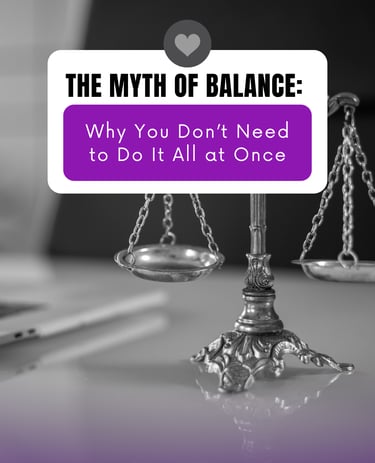The Freedom of Focus: Why Leaders Thrive Without Perfect Balance
The Myth of Balance: Why You Don’t Need to Do It All at Once
Dr. Bruce Huntley
What BJ Fogg and Patrick Lencioni Teach Us About Real Progress
For years, leaders have been told to strive for balance - as if leadership, family, wellness, spiritual growth, and organizational impact all deserve equal attention at the same time. It sounds noble. It sounds responsible.
But it’s a myth.
And it’s quietly exhausting many leaders who are trying to carry too much, too evenly, all at once.
Here’s the truth: You don’t need to do everything at the same time to live and lead well.
The real win comes from focused priorities, small habits, clear commitments, and aligned teams.
This is where the insights of two leadership thinkers - BJ Fogg and Patrick Lencioni - offer clarity, relief, and a way forward.
1. You Don’t Need Balance - You Need Tiny Wins
BJ Fogg’s research shows that the most powerful change doesn’t happen through willpower or intensity. It happens through consistent, tiny habits that compound over time.
He says: “Small is big when done consistently.”
In other words: Stop trying to overhaul your life. Start making small moves that matter.
Why leaders get stuck:
They try to fix everything at once.
They try to maintain balance across too many priorities.
They underestimate how small habits create massive transformation.
Tiny habits work because they:
are easy to start
are easy to repeat
build confidence
reinforce identity
create momentum
You don’t need balance.
You need consistency in what matters most.
2. Clarity Beats Balance Every Time
Patrick Lencioni makes one thing very clear:
“Healthy organizations win.”
But health doesn’t come from leaders trying to balance every initiative, every person, every request, or every fire at the same time. It comes from:
clarity of purpose
alignment around priorities
courage to say no
healthy conflict
mutual accountability
When everything is a priority, nothing is.
Lencioni teaches that leaders must create a clear, compelling direction - something that helps teams understand not only what they should do, but what they should not do.
The myth of balance tells leaders they need to hold everything at the same level.
Lencioni’s work tells leaders they need to hold the right things at the highest level.
3. Grounded Leadership Requires Selective Focus
In my coaching practice, I remind leaders of two truths:
You cannot be excellent everywhere all at once.
You can be excellent in what matters most right now.
Balance assumes that all priorities need equal distribution.
Leadership requires that priorities receive intentional, unequal distribution based on season, mission, and impact.
Instead of balance, aim for:
alignment
rhythm
seasonality
discernment
strategic focus
This is how leaders protect their energy and their mission.
4. A Simple Framework: The Three Buckets of Focus
Here’s a tool I share often with nonprofit and mission-driven leaders:
Bucket 1: What must be done now - The work that directly fuels mission and momentum.
Bucket 2: What must be supported - Important, but not urgent - and should be delegated or shared.
Bucket 3: What must wait - Good ideas, good opportunities, wrong season.
Balance wants these equal.
Leadership knows these are not equal.
5. Where BJ Fogg and Lencioni Meet: Clarity + Consistency
Fogg reminds us: small habits create big impact.
Lencioni reminds us: healthy organizations create clarity.
Put them together and you get this truth:
You don’t need balance. You need clarity on what matters and consistency in how you show up.
That’s where confident leadership is formed.
That’s where sustainable progress lives.
That’s where organizations grow with purpose.
Reflection Questions for Leaders
Use these this week:
What tiny habit could I practice daily that strengthens my leadership?
What priority needs my focused attention this season?
What good opportunities need a “not right now”?
Who can I partner with or delegate to so I’m not carrying everything alone?
Where am I confusing balance with obligation?
Final Word
You were never meant to carry everything evenly.
You were meant to carry the right things intentionally.
Let go of the myth of balance.
Lead with clarity, act with consistency, and let the rest wait.
Your mission deserves nothing less.






